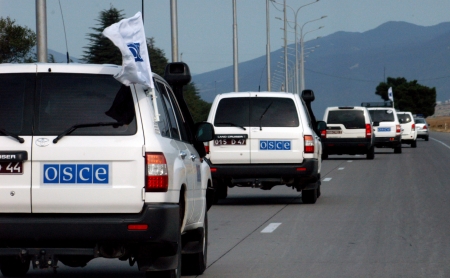
OSCE Mission in Georgia on Its Death Bed
Publication: Eurasia Daily Monitor Volume: 6 Issue: 3
By:

With a sleight of its hand, Russia has run the OSCE out of South Ossetia. The mandate of the OSCE Mission in Georgia expired on January 1, because Russia blocked the routine annual extension of that mandate by the organization. This is only the latest OSCE presence that Russia has terminated with impunity. Previously, it had forced the closure of the OSCE Border Monitoring Operation in Georgia in 2005 and then kicked the OSCE’s election-monitoring arm, ODIHR, out of Russia, ahead of the December 2007 parliamentary elections and the April 2008 presidential elections.
This OSCE Mission’s termination could, however, be a blessing in disguise, if the European Union rises to the occasion and extends its own Monitoring Mission (EUMM) from Georgia’s interior into South Ossetia, filling the vacuum in the OSCE’s wake. The EU will face a similar challenge in Abkhazia when the United Nations mission’s mandate expires in February. The head of the OSCE Mission in Georgia, Finnish diplomat Terhi Hakala, has declared her “hope that the European Union’s mission will combine our functions” (Georgian Public TV, December 23, 2008). Hakala has brought a distinctly higher level of motivation and commitment to this mission than some of her predecessors, but the OSCE’s own system poses insuperable odds to the organization’s ambitions as a security actor.
The mission in Georgia employs some 180 international and local personnel, only eight of whom were authorized to monitor South Ossetia. They left during the Russian invasion in August, were not allowed by the Russians to return there, and are now grounded along with the entire mission since the expiry of the latter’s mandate.
Russia finds it easy to humiliate the OSCE by exploiting the organization’s veto system, known euphemistically as consensus-based decision-making. Moscow’s “withholding of consensus” suffices to block the organization’s decisions. OSCE officials alternate between accepting the defeat silently (sometimes in denial) or professing “surprise” and even shock, only to revert promptly each time to business as usual with Russia as instructed by their home governments. Those who tout the OSCE’s added value as consensus-based “cooperative security” unwittingly invite further Russian abuse of the organization and, equally unwittingly, advertise the OSCE’s costly irrelevance.
There never seems to be a cost, however, to Moscow’s rogue behavior within the organization. The OSCE’s 2009 Greek chairmanship continues the 2008 Finnish chairmanship’s quest for a bureaucratic paper-over solution acceptable to Russia. The main goal behind these attempts is institutional perpetuation, relegating effectiveness to a secondary priority. At stake in the continuing discussions are the legal formulations and operating powers in a possible new mandate. The OSCE and some EU countries are trying to keep this mission alive in 2009, while Russia does not entirely rule out this possibility but on terms it would itself define.
Moscow has already accomplished its minimal goal to remove the OSCE Mission in Georgia from South Ossetia. The mission had a grand total of eight unarmed monitors, whom Russia has not allowed to return there since the August 2008 invasion. Shortly after the invasion Russia approved another 20 monitors for the mission to deploy in Georgia’s interior, not in South Ossetia; and only until February 19. This arrangement exemplifies the close control that Russia can impose on a field presence of the OSCE. The Kremlin does not risk admitting even such symbolic numbers of monitors in South Ossetia while the ruins of ethnically cleansed Georgian villages are still smoldering and the Russian military is building new bases in defiance of the French-brokered armistice.
Beyond that minimal goal, Russia seeks to use the OSCE for legitimizing South Ossetia’s “independence,” as Moscow labels its annexation. It wants the OSCE to establish a new, distinct mission in South Ossetia, implicitly or explicitly recognizing the authorities of a South Ossetian “sovereign state” and negotiating with them the mission’s mandate and operational modalities in detail (see EDM, December 11, 19, 2008).
In that case, Russia would have no objection to the continuation of the OSCE Mission in Georgia, separate from any OSCE presence in South Ossetia, with a mandate and operating authority that would no longer include that territory (or Abkhazia). Such a separation and restriction would also amount to OSCE recognition of Georgia’s territorial dismemberment by Russia. The Russians made these proposals public at the OSCE in Vienna during the final days before the expiry of the Tbilisi-based mission’s mandate (Russian Ministry of Foreign Affairs website cited by Interfax, December 23, 31, 2008).
The OSCE’s 2009 Greek chairmanship has inherited from its Finnish predecessor a proposal to split the existing mission into two OSCE field presences—one remaining in Tbilisi, another being set up in South Ossetia—both under the authority of one chief in Vienna, who would be authorized to move across the Russian-imposed demarcation line. This petty bureaucratic artifice would, however, do nothing to address the fundamental requirements of the situation.
If anything, the chairmanships’ proposal attempts to evade those requirements. These include unimpeded international access to South Ossetia, observance of the ceasefire, incident- and crisis-prevention, implementation of the August and September armistice agreements, and return of Georgian expellees to their places of residence under safe conditions. The OSCE, bound by the Russian veto, is clearly not up to this task. It is the European Union’s turn to act where the OSCE was bound to fail.




